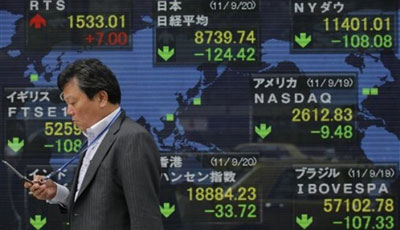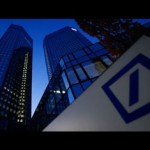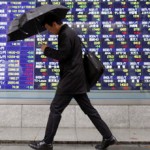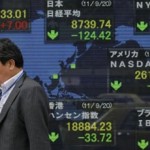Asian Stocks Rebound as Deutsche Bank Concern Ebbs; Pound Drops

- German lender’s U.S. fine reported to be less than feared
- U.K.’s May says Brexit process to start by end of March
Asian stocks rose and regional bonds fell as concern about Deutsche Bank AG’s finances eased after the lender was reported to be lining up a less-costly settlement with U.S. regulators than investors had feared. Brexit angst weighed on the pound and oil declined.
Financial shares helped the MSCI Asia Pacific Index recoup more than half of Friday’s loss, after the S&P 500 Index advanced in the last session. Sterling slid versus most of its major peers after British Prime Minister Theresa May said she’ll start pulling the U.K. out of the European Union in the first quarter of 2017. Crude retreated from a six-week high as U.S. producers increased drilling, while New Zealand’s 10-year bond yield rose from a three-week low. Markets in China, Malaysia and South Korea were shut for holidays on Monday.
Relief spread across U.S. and European equity markets on Friday as Agence France-Presse reported that Deutsche Bank was nearing a $5.4 billion settlement with the American Department of Justice, less than half the amount initially sought in connection with a probe into mortgage-backed securities. The financial woes of Germany’s biggest lender as it struggles with tougher capital standards and soaring legal bills adds to a list of market risks that includes Brexit and tightening U.S. monetary policy.
“Investors were nervous about the uncertainty surrounding Deutsche Bank and the potential spillover effect on other European banks, but the mood is to take a wait-and-see approach for now,” said Yutaka Miura, senior technical analyst at Mizuho Securities Co. in Tokyo.
Japan’s quarterly Tankan index of sentiment among large manufacturers came in slightly weaker than economists had expected, a report showed Monday. China’s official manufacturing purchasing managers’ index steadied at the highest level in almost two years and services picked up, data showed over the weekend. South Korea reported a bigger-than-expected drop in exports for September, ahead of the release of manufacturing gauges for the U.S. and the euro area.
Stocks
The MSCI Asia Pacific Index rose 0.6 percent as of 1:50 p.m. Tokyo time, after falling 1.1 percent in the last session. Financial shares accounted for about a quarter of the move, buoyed by Deutsche Bank’s 6.4 percent surge in Germany on Friday. The German lenders’ shares sank to a record low last week and are still down more than 50 percent from where they were a year ago.
“Concern about Deutsche Bank is far from over,” said Nicholas Teo, a strategist at KGI Fraser Securities in Singapore, said by phone. “Systemic risk is a real possibility with the derivatives exposure that plagues Deutsche.”
Australia’s S&P/ASX 200 Index climbed to a one-month high with trading volumes about 50 percent below their 30-day average amid holidays in states including New South Wales. Benchmarks in Hong Kong, Indonesia and Japan rose more than 1 percent.
Galaxy Entertainment Group Ltd. rallied more than 3 percent in Hong Kong after Macau reported a bigger-than-expected increase in its gambling revenue for September. China Overseas Land & Investment Ltd. slid to a two-week low after local governments in seven Chinese cities tightened home-buying rules. CapitaLand Ltd., Singapore’s biggest developer, fell as much as 1.9 percent after a report showed the city-state’s home prices dropped in the last quarter by the most in seven years. Kawasaki Heavy Industries Ltd. tumbled 11 percent in Tokyo after the company slashed its profit forecast.
Futures on the S&P 500 Index were little changed, after the underlying measure rallied 0.8 percent on Friday. Contracts on the U.K.’s FTSE 100 Index gained 0.2 percent.
Currencies
The pound dropped as much as 0.5 percent versus the dollar and lost 0.3 percent against the euro after May told delegates at her Conservative Party’s annual conference that she’ll invoke Article 50 of the EU’s Lisbon Treaty — the formal trigger for two-years of exit talks — by the end of March. Sterling tumbled the most on record to a more than 30-year low in the wake of the June vote in favor of Brexit.
“We’re back to the Brexit risks,” said Vishnu Varathan, a senior economist at Mizuho Bank Ltd. in Singapore. “The sterling has taken a bit of knock first. If the concerns become wider concerns about financial market contagion we will find that the slight softening that we’ve seen in the dollar trend will be shaken off.”
New Zealand’s dollar weakened 0.3 percent before Fonterra’s GlobalDairyTrade whole milk powder auction on Tuesday. Milk is the South Pacific nation’s No. 1 export and prices fell when the fortnightly sale was last held on Sept. 20.
The offshore yuan was little changed at 6.6762 per dollar in its first trading session since the Chinese currency was added to the International Monetary Fund’s Special Drawing Rights on Saturday. Onshore markets are shut for all of this week.
Commodities
Crude oil fell 0.7 percent to $47.90 a barrel after rising 8 percent over the previous three sessions as OPEC members forged a preliminary agreement to reduce output. The number of rigs targeting crude in the U.S. rose for a fifth consecutive week, Baker Hughes Inc. said Friday. Iran wants to increase exports to 2.35 million barrels a day in the coming months, state news agency IRNA reported.
Gold was little changed after sliding 1.6 percent last week, the most since July.
Bonds
New Zealand’s 10-year bond yield rose by four basis points to 2.33 percent and Japan’s added one basis point to minus 0.075 percent. The rate on similar-maturity U.S. Treasuries increased by one basis point to 1.60 percent, after gaining three basis points on Friday.
Source: Bloomberg – Asian Stocks Rebound as Deutsche Bank Concern Ebbs; Pound Drops




























